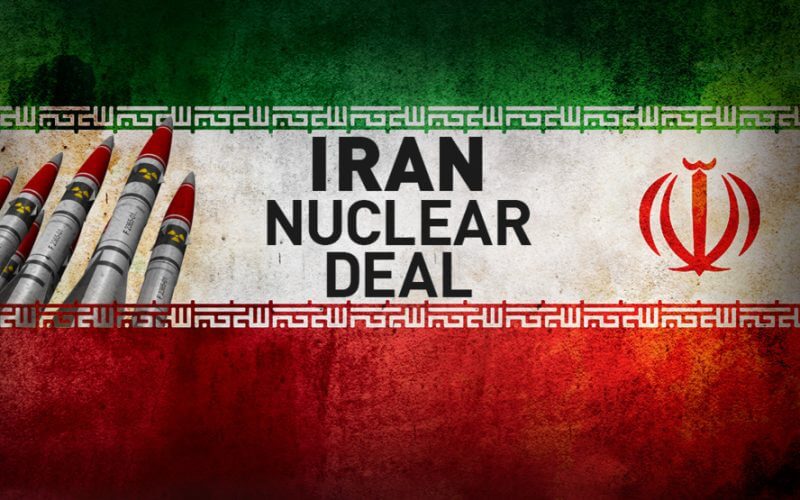Following reports that the Biden administration is pursuing an interim agreement with the Islamic Republic of Iran that would include sanctions relief in exchange for Tehran freezing parts of its nuclear program above 60 percent purity in atomic enrichment, officials from the Biden administration have not denied claims, describing the plans as "rumors."
According to the International Atomic Energy Agency report last February, Iran amassed 87.5 kilograms of 60 percent enriched uranium. Officials say that if the uranium gets up to 90 percent weapons grade, it would be a good amount needed to produce at least one nuclear bomb. White House officials have stopped short of denying the latest news, suggesting to many in Washington that the proposed plan is attempting to go into effect.
Experts familiar with Iran's nuclear program say that if sanctions are reduced in exchange for freezing Iran's enrichment activities, the United States will recognize the Islamic Republic to have nuclear fissile material to make deadly atomic weapons. Under this interim deal, Iran could change its mind and revoke such an agreement, racing towards a bomb in the next few months while earning revenue from sanctions relief.
"Despite saying for months that nuclear deal negotiations with the Islamic Republic were not on its agenda, the Biden administration has not adjusted its Iran policy to extend beyond its hopes of reviving the JCPOA," said Andrew Ghalili, a Senior Policy Analyst for the National Union for Democracy in Iran (NUFDI).
In September 2022, Western and Islamic Republic officials were on the cusp of reviving the 2015 nuclear agreement revoked under the Trump administration, granting Iran sanctions waivers on oil production and billions of assets unfrozen overseas. However, Iranian officials pulled out after UN officials declined its demand to shut down the International Atomic Energy Agency (IAEA) investigation into undeclared underground nuclear sites.
"The larger concern with this development though is not that this interim deal will happen, but that it is now even clearer the Biden administration's words of support for the Iranian people, and its repeated statements that nuclear negotiations were 'not on the agenda,' were essentially virtue signaling," Ghalili told The Foreign Desk.
Ghalili also referred to a recent NUFDI Policy Brief outlining the main points of the interim deal. In the report, Ghalili stated that "despite saying for months that nuclear deal negotiations
with the Islamic Republic were not on its agenda, the Biden administration has not adjusted its Iran policy to extend beyond its hopes of reviving the JCPOA."
According to the NUFDI Policy Brief, the interim deal is unlikely to come alive because the Islamic Republic has "repeatedly rejected every U.S. and EU nuclear deal proposal over the past two years and has reportedly already rejected the idea of this interim deal proposal."
The group also notes that the goal of this interim deal is to "keep negotiations alive until both sides can agree to a revival of the JCPOA, but the Biden administration's failure to negotiate an extension of any sunset clauses in the JCPOA means that many of the nuclear restrictions it places on the Islamic Republic expire within the next few years, beginning in 2023."
The third and final reason the agreement will not come through, according to the NUFDI Policy Brief, is because the regime's nuclear program has "made significant progress since President Biden took office, including reportedly enriching uranium to 84 percent for the first time in February 2023."
Gabriel Noronha, an ex-State Department Iran advisor during the Trump administration, and other experts voiced opposition to such a potential move by the Biden administration, arguing that such a deal would allow the Islamic Republic to legally purchase and sell missiles, drones, and other types of weapons to countries like China under international law.
“The Biden administration has always prioritized getting negotiations over building leverage - that is why its efforts to re-enter the JCPOA were unsuccessful. Once again, it is prioritizing talks with its latest idea of "less-for-less" instead of pressuring the Europeans to snapback UN sanctions or getting creative with ways to reduce Iran's oil exports,” Noronha told The Foreign Desk.
According to media reports, Likud Prime Minister Benjamin (Bibi) Netanyahu told the Biden administration and European officials that the Islamic Republic faced a military strike if it enriched uranium above 60 percent. During an intelligence staff gathering this week, the Israeli Prime Minister said, "In every generation, there are those who rise up to destroy us, and in this generation, Iran has risen up to destroy us. If we do not prevent Iran from obtaining nuclear weapons, we will be in a different reality in which the entire world will be hostage to those who have inscribed on their flag their desire to destroy us; therefore, this is our supreme mission."
After the death of 22-year-old Mahsa Amini at the hands of the Islamic Republic's morality police over her hijab wear, young and old Iranian citizens took to the streets to protest against the Ayatollahs, calling for their downfall and for the U.S. to not negotiate with the regime officials to provide them with sanctions relief. In the U.S., Iranian Americans have rallied behind their compatriots in Iran, voicing their opposition towards the nuclear agreement and calling on the Biden administration to fire Robert Malley, the U.S.-Iran envoy who has a record of showing sympathy for Iran’s regime.
Related Story: Biden Administration Reportedly Proposes an Interim Iran Nuclear Deal









